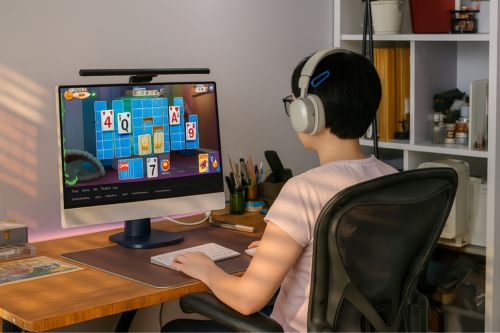Are Card Games Good for Your Brain?

Let’s be honest, card games get a bad rap sometimes. Too slow. Too old-school. Too many dads falling asleep mid-game.
But here’s the truth: card games are secretly one of the most accessible, fun, and science-backed ways to give your brain a little love.
Whether you're playing a solo round of Solitaire or battling it out in a late-night Uno showdown, every shuffle, match, and move is firing up parts of your brain you didn’t even know you were using.
Let’s unpack why card games are low-key brilliant for mental health and brain fitness at any age.
1. They Train the Brain Without Feeling Like “Training”
You know how going to the gym feels… effort-y? Card games are like the mental version of a dance class: you move, you think, you smile, and suddenly you’ve burned some brain calories.
You’re processing rules
Making micro-decisions
Holding sequences in your head
And constantly adjusting strategy
In other words: this is way more than casual fun. It’s lightweight cognitive conditioning.
2. They Activate Different Parts of Your Brain (Depending on the Game)
Different card games tap into different mental skills. It’s like brain cross-training, minus the sweatbands.
Solitaire: Trains memory, focus, and pattern recognition. It’s calm but keeps your brain quietly on its toes.
Uno: Boosts reaction time, cognitive flexibility, and number/color association (plus, it's chaos in the best way).
Bridge: A full-on mental workout. You’ll need strategy, long-term planning, and good communication.
Memory (Pairs): Sharpens visual memory and attention to detail. A classic for a reason.
Poker: Not just luck! It builds risk assessment, emotional control, and yes...bluff detection.
Playing a variety of games = a well-rounded brain buffet.
3. They Help You Get “In the Zone”
Ever start a game and look up 20 minutes later like, “Wait—where did the time go?” That’s called a flow state.
Card games are perfect for flow. They’re challenging, but not overwhelming. Structured, but still full of surprises. And best of all—they let your brain lock into something without being overstimulated.
It’s like meditation… with shuffling.
4. They Support Long-Term Brain Health
There’s real research behind this. Studies show that older adults who regularly play card games may experience:
Slower cognitive decline
Lower risk of memory-related conditions
Increased social connection (which boosts mental health too)
You don’t need to memorize 500 chess openings or do daily brain training apps. Just play cards regularly, and your future brain will thank you.
5. They Bring People Together (Yes, That Counts!)
Okay, this one isn’t strictly brain science… but it kind of is?
When you play card games with others, online or in person, you’re communicating, reading signals, managing emotions, and learning to win (or lose) with grace.
All of that boosts emotional intelligence, which is just as important as memory or logic when it comes to brain health.
So yes, that weekly card night with your aunt is technically mental exercise.
So... Are Card Games Good for Your Brain?
They’re fun. They’re flexible. They sneak in brain benefits while you’re too busy enjoying yourself to notice.
So go ahead, deal yourself in.
Your brain loves it here.
Looking for a Smart, Calming Game to Try?
Check out Solitaire Home Story, the classic card game reimagined with a relaxing storyline, lovable characters, and a cozy vibe that keeps you coming back for “just one more level.”
